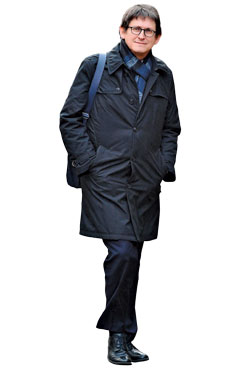
The Guardian is a very different kind of beast from other papers,” Alan Rusbridger tells me, strolling through the British newspaper’s new American office, a bright-white Soho loft with rows of bright-white tabletops—almost a fantasy of European cool. “It’s always been an outsider. It’s never been in the club. Which is why I think it’s not an accident that The Guardian ended up doing the phone-hacking story. It took an outsider to see that this was a story, and to do it.”
Two years ago, Charlie Rose mispronounced Alan Rusbridger’s name when introducing him—Rusbrigger, he called him. These days, the editor of The Guardian is a journalistic “global celebrity,” as Bill Keller put it to me—Adweek dubbed him “the Ben Bradlee of phone hacking.” It was under his leadership that the paper broke the WikiLeaks story, then the News of the World phone-hacking scandal, then the efforts at Rupert Murdoch’s company to cover it up. Guardian reporting triggered investigations that have so far led to arrests of more than 40 Murdoch journalists and executives. “Something happened last year,” says Rusbridger, slipping into a sweet reminiscence about the halfway downfall of Britain’s media king, who seems never far from his mind. “It was quite extraordinary if you lived through this period to see … the bursting of the bubble.”
Now, having shoved Murdoch off his pedestal, Rusbridger finds himself staring down a different kind of challenge. His paper is running out of money: It lost roughly $50 million last year, and though it’s subsidized by a nonprofit trust, at that rate it can survive for at most another five years. Thus, the new American edition: 30 journalists turning out daily columns, reporting, and incessant live-blogging—not just on Americans but for Americans.
“Why are we in America?” he asks, facing me across a small round table in a corner office, another sleek white box. There’s barely a picture on the wall or a paper on the desk—it’s as clutter-free as a monk’s quarters. “We’re in America because a third of our audience is in America.” The Guardian has about 20 million monthly online readers in the United States, he says—a natural growth opportunity. But Rusbridger’s plan doesn’t require the company to ever actually turn a profit. “Within four years we will have brought losses down to a single figure,” he says. That’s a single figure in millions of pounds. “Which is sustainable.”
In the meantime, he’s set about building a news operation here. And today, he’s been corralled into addressing the troops, not an entirely comfortable duty. “The Guardian is a cult,” one devoted member tells me, and they want to hear from their enigmatic leader. A few dozen journalists push chairs into a semicircle at the vacant far end of the loft; Rusbridger takes a spot at the center, as if ready to be examined. “The Guardian’s mission in America is to be its leading progressive news organization,” he tells the staff. Then he twists his legs, folds his arms, and reminds them that their job is to “make waves.”
Even in the midst of these admiring journalists, Rusbridger, 58, seems less a commanding newsroom boss than a grown-up Harry Potter: foppish hair, schoolboy smile, and, until recently, round wire-frame glasses (which he swapped for a dark rectangular pair). And unexcitable—“Zen,” as one of his journalists put it to me. “You’re very calm,” I tell him. “I try to be,” he says, maintaining a metronomically balanced cadence, even when conversation turns to the Guardian’s bruising battle with Murdoch.
“I’m not a Murdoch hater,” Rusbridger says, though he makes a point of noting he “effectively called us liars.” More important: He’s also not afraid of him. People believed “it was a bad mistake to make an enemy of Murdoch,” Rusbridger says. “News International knew that, and they felt that that gave them some kind of immunity. And so they didn’t have to play by the normal rules, and they would get away with it.”
There are similarly well-established competitors in this country, too, of course, and Rusbridger acknowledges he can’t compete here with the firepower of newspapers like the Times. And so the American edition, which is web-only, depends on less labor-intensive strategies, notably what Rusbridger calls “open journalism,” in which readers help report the news. “I believe that is quicker in building an audience,” he says, “and is editorially a better account of the world.” It doesn’t hurt that it’s also cheaper.
Have good intel? Send tips to intel@nymag.com.